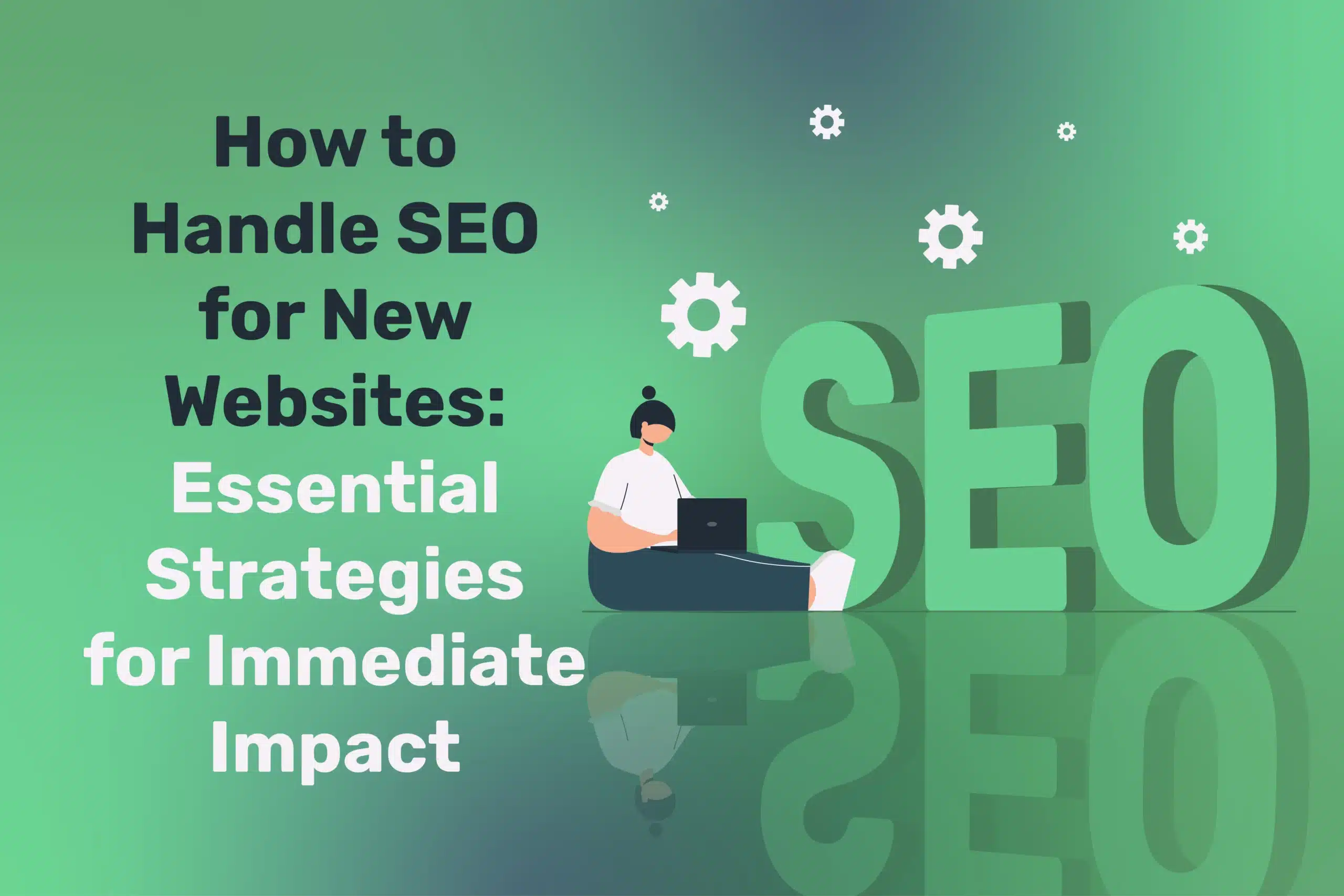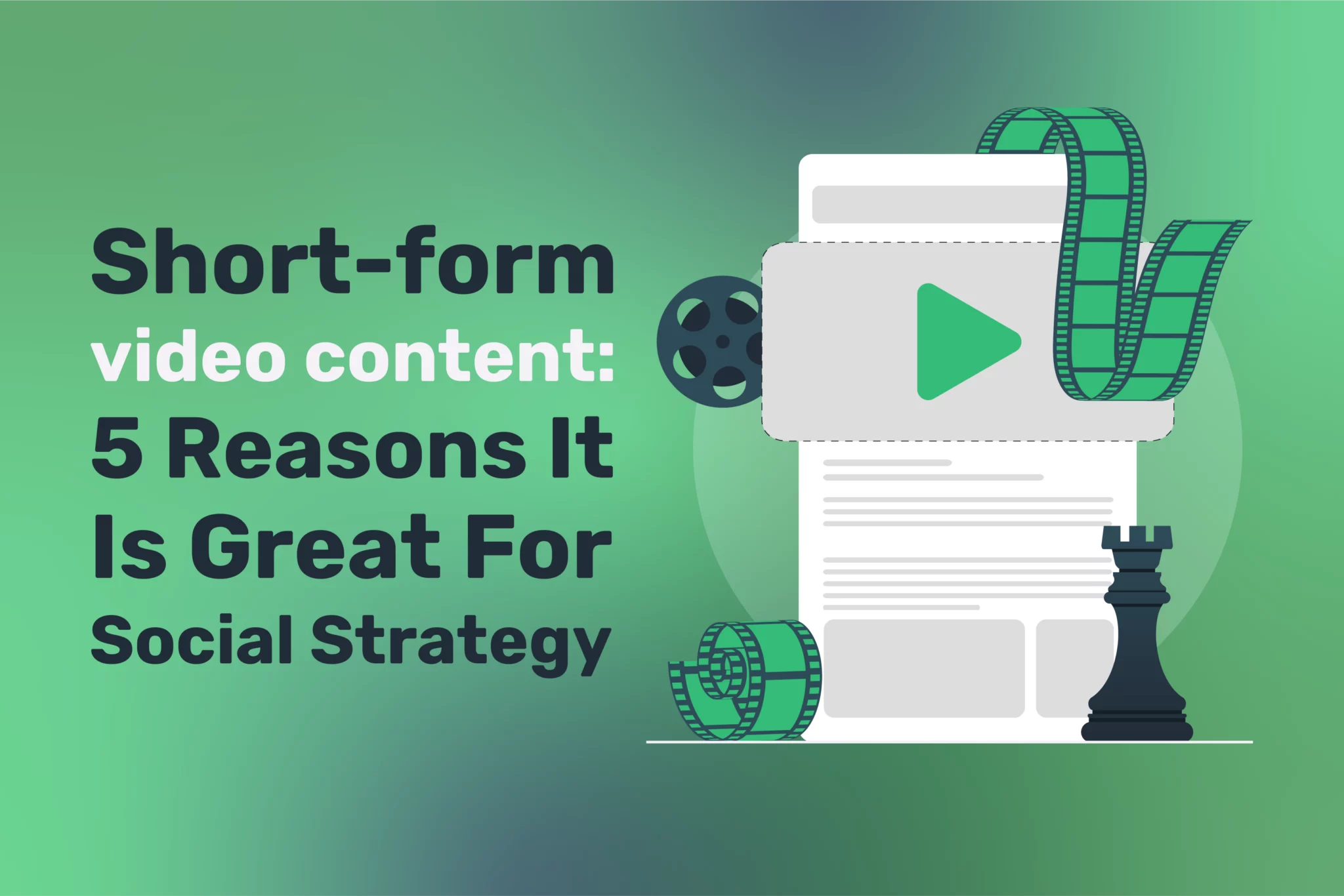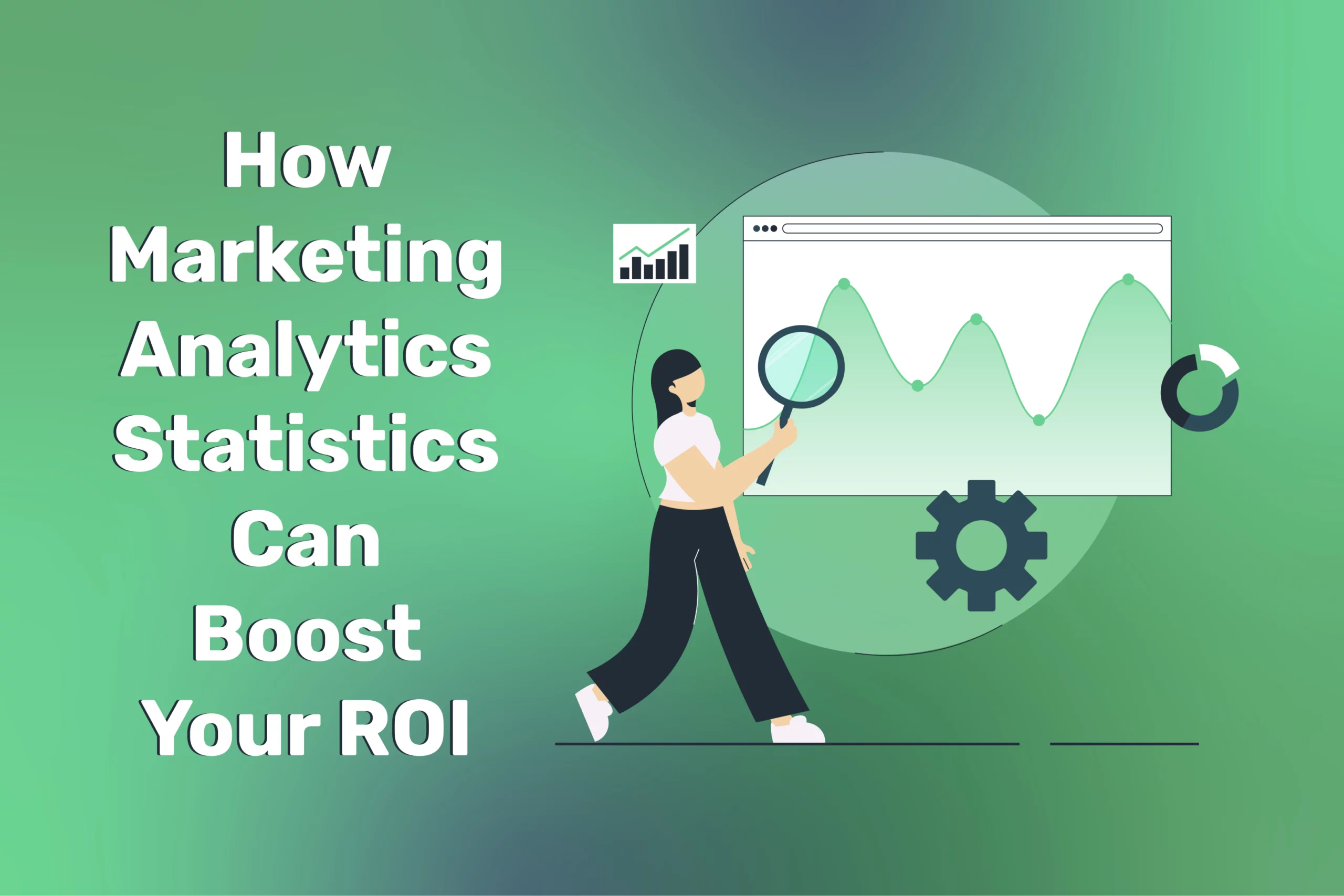
Bold Digital Marketing Landscape for Small Businesses in 2025
Table of Contents
Bold Digital Marketing Landscape for Small Businesses in 2025. The digital marketing landscape continues evolving at a breakneck pace, creating opportunities and challenges for small business owners. With the global digital marketing market projected to reach £472.5 billion in 2025 and growing at a 13.6% CAGR through 2033, the stakes have never been higher for small businesses looking to establish a meaningful online presence.
For UK small businesses in particular, 2025 marks a pivotal year, with 54% citing increasing sales revenue as their top digital marketing goal. This focus comes as digital channels demonstrate superior ROI compared to traditional marketing approaches, particularly for businesses with limited budgets and resources.
This comprehensive guide examines the latest trends, statistics, and strategic approaches to help small business owners navigate the complex digital marketing landscape. From emerging AI applications to shifting privacy regulations, we’ll explore how to develop an effective digital marketing strategy that drives measurable business growth without overwhelming your team or budget.
Why Digital Marketing Services Are Essential for Small Businesses
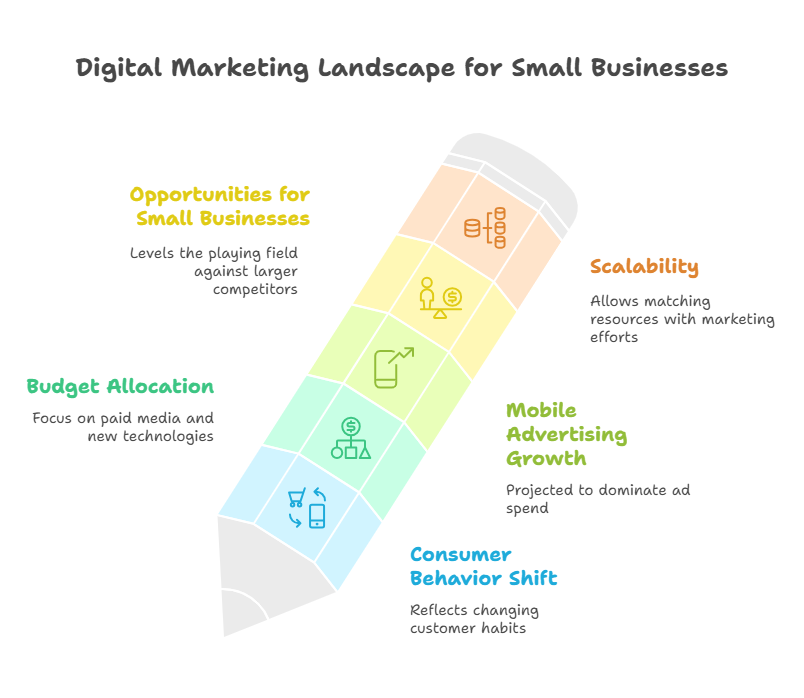
The continued expansion of digital channels reflects a fundamental shift in consumer behaviour. Over half of company marketing budgets are allocated to paid media and new technologies, with mobile advertising set to account for 70% of all ad spend by 2028. This shift isn’t merely about following trends—it’s about meeting customers where they increasingly spend their time and make purchasing decisions.
Digital marketing offers small businesses unprecedented opportunities to level the playing field against larger competitors. Unlike traditional advertising channels that require substantial upfront investment, digital marketing services can be scaled to match available resources while still delivering meaningful results.
Cost-Effectiveness and Targeted Reach
Perhaps the most compelling advantage of digital marketing for small businesses is the ability to target ideal customers precisely. Rather than broadcasting messages to general audiences (as with traditional media), digital channels allow for granular targeting based on demographics, interests, behaviours, and even purchase intent.
This targeted approach significantly improves marketing efficiency by:
- Reducing wasted ad spend on uninterested audiences
- Enabling personalised messaging that resonates with specific customer segments
- Providing detailed performance metrics for ongoing optimisation
- Allowing for flexible budget allocation based on real-time results
For UK small businesses with limited marketing resources, this efficiency translates to more leads, sales, and growth opportunities per pound spent—a critical advantage in competitive markets.
Key Digital Marketing Services for Small Businesses
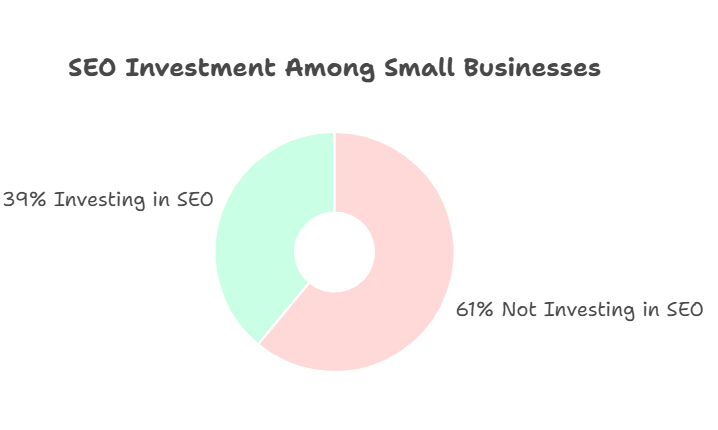
Despite its proven effectiveness, 61% of small businesses aren’t currently investing in SEO, missing out on valuable high-intent customer traffic. This represents a significant opportunity for companies willing to invest in professional SEO services.
Current SEO trends shaping small business success include:
Local SEO Dominance: Local SEO has become essential for businesses serving specific geographic areas. With 46% of all Google searches having local intent, optimising for “near me” searches and maintaining accurate Google Business Profiles delivers substantial benefits for brick-and-mortar businesses.
Zero-Click SEO Strategies: As Google increasingly displays information directly in search results (without requiring users to click through to websites), small businesses must adapt their SEO strategies to capture visibility in featured snippets, knowledge panels, and local packs.
AI-Driven Content Optimisation: Advanced AI tools now help identify content gaps, optimise on-page elements, and suggest strategic improvements based on competitor analysis, making professional-level SEO more accessible to small businesses.
Ciaran Connolly, Director of ProfileTree, notes: “For our small business clients, SEO consistently delivers the highest long-term ROI of any digital marketing channel. The key is approaching it strategically rather than tactically, focusing on content that genuinely answers customer questions while aligning with business objectives.”
Content Marketing
Content marketing forms the foundation of most successful digital marketing strategies, with 76% of marketers using blogs as their primary content format. For small businesses, content marketing offers compounding returns as assets continue working long after creation.
Current content marketing trends for small businesses include:
Story-Driven Content: Authentic storytelling that connects with audience values and experiences now outperforms purely promotional content across nearly all metrics. Small businesses have a natural advantage here, as they can often tell more genuine, relatable stories than larger corporate competitors.
Video Content Evolution: Short-form interactive videos can boost sales and conversions by up to 80%, making video marketing increasingly essential for small businesses. Platforms like TikTok, YouTube Shorts, and Instagram Reels have democratised video creation, allowing small businesses to reach large audiences with minimal production costs.
User-Generated Content: Customer reviews, testimonials, and social media mentions have become powerful trust signals. Small businesses that systematically collect and showcase authentic customer content see significantly higher conversion rates than those relying solely on branded content.
For resource-constrained small businesses, working with a content marketing agency can help develop a sustainable content strategy that aligns with business objectives while maintaining consistent quality and publishing cadence.
Social Media Marketing
Social media has evolved from a simple brand awareness channel to a comprehensive marketing ecosystem. With 54% of internet users researching products and services via social platforms and 76% having purchased something they saw on social media, these platforms now influence every stage of the customer journey.
Key social media trends for small businesses include:
Direct Messaging for Customer Service: 42% of UK businesses now use social media DMSS for customer service, with many planning to expand these efforts in 2025. This shift reflects consumer preferences for convenient, immediate support through familiar platforms.
Platform Specialisation: Rather than maintaining a presence across all social platforms, successful small businesses are focusing resources on 1-2 platforms where their specific audience is most active and engaged.
Micro-Influencer Collaborations: Partnerships with niche influencers (typically with 5,000-50,000 followers) now outperform broad, high-cost influencer campaigns for most small businesses, delivering better engagement rates and conversion metrics at lower costs.
Community Building: The most successful small businesses on social media focus on building engaged communities rather than simply accumulating followers, prioritising meaningful interactions over vanity metrics.
For many small businesses, working with a social media marketing specialist can help develop platform-specific strategies that align with broader business objectives while maintaining a consistent brand voice across channels.
Paid Advertising (PPC & Social Ads)
While 65% of people click on search ads when shopping online, only 40% of small businesses use this channel, dropping to just 27% for those with monthly budgets under £1,000. This underutilisation creates opportunities for small businesses willing to invest strategically in paid advertising.
Current paid advertising trends include:
First-Party Data Utilisation: As privacy regulations tighten and third-party cookies disappear, small businesses must collect and leverage their own customer data for targeting and tracking campaign performance.
Performance Max Campaigns: Google’s automation-driven campaign types now allow small businesses to run sophisticated multi-channel ad campaigns without requiring extensive technical expertise.
Retargeting Sophistication: Advanced retargeting strategies now go beyond simple reminders, using sequential messaging that addresses specific objections or provides additional information based on previous interactions.
Local PPC Targeting: Geotargeted search and social advertising allow small businesses to focus ad spend on customers within their service area, dramatically improving campaign efficiency for local businesses.
For small businesses new to paid advertising, working with a digital marketing agency can help develop effective campaigns while avoiding common pitfalls that often lead to wasted ad spend.
Email Marketing
Despite the rise of new channels, email marketing remains one of the most effective digital marketing tools for small businesses, delivering an average ROI of 4,200%. Unlike social media or search, email provides a direct, owned channel to communicate with prospects and customers without algorithm interference.
Current email marketing trends for small businesses include:
Advanced Personalisation: Beyond basic name insertion, small businesses now personalise email content based on previous purchases, browsing behaviour, and engagement patterns.
Automated Email Sequences: Sophisticated email workflows triggered by specific customer actions (website visits, cart abandonment, purchase completion) nurture leads and customers with minimal ongoing effort.
Interactive Email Elements: Polls, surveys, and clickable elements within emails increase engagement and provide valuable customer insights without requiring recipients to leave their inboxes.
Privacy-Compliant List Building: With tightening privacy regulations, small businesses must develop transparent, value-focused approaches to email list building that prioritise clear consent and genuine value exchange.
For small businesses without dedicated marketing teams, working with a digital marketing specialist can help implement sophisticated email marketing strategies that deliver consistent results with minimal day-to-day management.
AI & Automation
AI adoption among small businesses has accelerated dramatically, with 52% now using AI for content creation, 39% for social media management, and 34% for customer service chatbots. This democratisation of AI tools has made sophisticated marketing capabilities accessible to businesses of all sizes.
Key AI and automation trends for small businesses include:
AI-Assisted Content Creation: Advanced AI tools now help small businesses create blog posts, social media content, and email copy that maintains brand voice while significantly reducing production time.
Conversational Marketing Automation: AI-powered chatbots provide 24/7 customer service, qualify leads, and guide website visitors to relevant information based on their specific needs and questions.
Predictive Analytics: AI-driven forecasting helps small businesses identify emerging opportunities, optimise marketing spend, and predict customer behaviour patterns.
Marketing Workflow Automation: Integrated automation platforms now connect multiple marketing channels and tasks, reducing manual effort while ensuring consistent customer experiences across touchpoints.
With 34% of UK businesses increasing investment in AI-driven marketing automation, small businesses that fail to adopt these technologies risk falling behind more efficient competitors.
Video Marketing
Video has evolved from a nice-to-have content type to an essential marketing channel, with formats ranging from professionally produced commercials to casual smartphone recordings. For small businesses, video marketing offers exceptional engagement rates and conversion potential.
Current video marketing trends include:
Platform-Optimised Video: Successful small businesses create video content specifically designed for the unique requirements and audience expectations of each platform rather than using identical content across channels.
Professional-Quality Production Tools: Affordable software and hardware now enable small businesses to create professional-looking videos without significant production expertise or budget.
Interactive Video Elements: Shoppable videos, embedded polls, and clickable elements transform passive viewing into interactive experiences that drive measurable actions.
Educational Video Content: Tutorial videos, product demonstrations, and how-to guides consistently outperform purely promotional content for most small businesses.
For small businesses looking to enhance their video marketing efforts, working with a video marketing specialist can help develop a strategic approach that aligns with broader marketing objectives while maintaining production quality and consistency.
Latest Trends Shaping Small Business Marketing
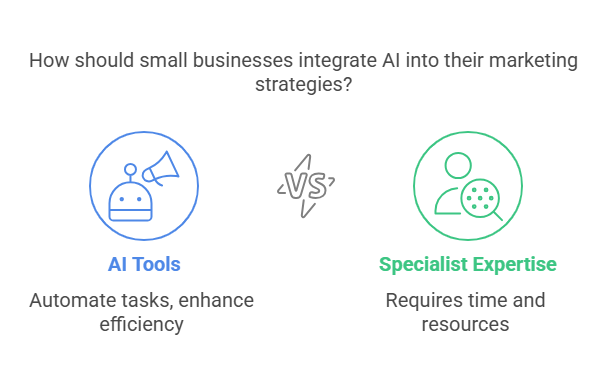
The integration of AI into small business marketing workflows represents perhaps the most significant shift in the digital marketing landscape. From content creation to campaign optimisation, AI tools now handle tasks that previously required specialist expertise or substantial time investment.
Landscape for Small Businesses, AI adoption offers several key advantages:
- Reduced time spent on routine marketing tasks
- More consistent content production and campaign management
- Data-driven optimisation without requiring advanced analytical skills
- Ability to implement sophisticated marketing approaches with limited team resources
However, successful AI integration requires strategic implementation and human oversight to ensure that generated content aligns with brand voice and business objectives.
Multi/Omni-Channel Marketing
With 34% of UK businesses increasing investment in multi-channel marketing, the integration of various marketing channels has become essential for delivering seamless customer experiences. Rather than treating each channel as a separate entity, successful small businesses develop cohesive strategies that guide customers through a consistent journey regardless of how they interact with the brand.
Key elements of effective multi-channel marketing include:
- Consistent messaging and visual elements across all platforms
- Coordinated campaign timing and themes
- Channel-specific content adaptations that maintain core messaging
- Cross-channel attribution to understand the full customer journey
Landscape for Small Businesses with limited resources, prioritising a few well-integrated channels typically delivers better results than attempting to maintain a presence across every available platform.
Analytics Dashboards and Performance Tracking
The ability to measure marketing performance accurately has become a critical differentiator for successful small businesses. Modern analytics platforms now offer comprehensive dashboards that consolidate data from multiple channels, providing clear insights without requiring advanced technical skills.
Essential analytics capabilities for small businesses include:
- Campaign performance tracking across all digital channels
- Customer journey visualisation from first touch to conversion
- Revenue attribution across marketing activities
- Competitor benchmarking and market trend identification
With these insights, small businesses can make informed decisions about resource allocation, identify underperforming initiatives, and continuously optimise marketing strategies based on actual results rather than assumptions.
Privacy-First Marketing
As privacy regulations tighten globally and major platforms restrict data sharing, small businesses must adapt their marketing approaches to prioritise consumer privacy while still delivering effective campaigns.
Key privacy-focused marketing strategies include:
- First-party data collection through direct customer relationships
- Clear, transparent communication about data usage and benefits
- Value-based opt-in incentives that clearly communicate benefits
- Server-side tracking implementation for more accurate attribution
Small businesses that proactively adapt to privacy changes often gain competitive advantages, as they’re seen as more trustworthy while simultaneously developing more resilient marketing systems.
Challenges and Missed Opportunities
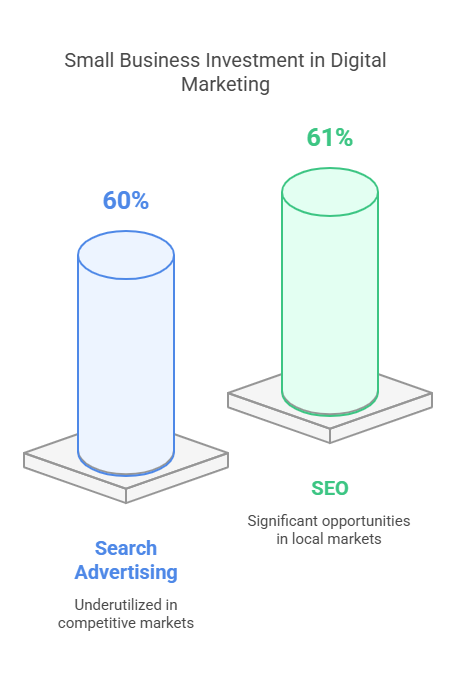
Despite their proven effectiveness, 60% of small businesses aren’t investing in search advertising, and 61% aren’t investing in SEO. This underutilisation creates significant opportunities for businesses willing to invest in these channels, particularly in competitive local markets.
Common barriers to adoption include:
- Perceived complexity and technical requirements
- Delayed results compared to some other channels
- Difficulty measuring direct ROI, particularly for SEO
- Lack of internal expertise to manage these channels effectively
For small businesses looking to capitalise on these missed opportunities, working with a professional SEO agency can provide the expertise needed while avoiding common implementation pitfalls.
Adapting to Privacy Changes and Regulations
The digital marketing landscape continues to undergo significant privacy-related transformations, from the phasing out of third-party cookies to increasingly stringent regulations around data collection and usage. Many small businesses struggle to adapt their marketing approaches to these changes, potentially exposing themselves to compliance risks and declining campaign performance.
Successful adaptation requires:
- Updating consent mechanisms and privacy policies
- Implementing proper tracking techniques that respect user privacy
- Developing first-party data strategies that don’t rely on third-party cookies
- Training staff on privacy compliance requirements
Small businesses that view privacy changes as an opportunity to build trust rather than a limitation often develop stronger customer relationships while maintaining marketing effectiveness.
Inconsistent Measurement and Strategy Adjustment
Many small businesses implement various digital marketing tactics without establishing clear measurement frameworks or regular review processes. This approach leads to continued investment in underperforming channels while missing opportunities to scale successful initiatives.
Effective measurement and optimisation require:
- Establishing clear KPIS aligned with business objectives
- Implementing proper tracking across all marketing channels
- Scheduling regular performance reviews with actionable outcomes
- Developing systematic testing approaches for continuous improvement
Even small businesses with limited resources can implement basic measurement frameworks that provide actionable insights without requiring sophisticated analytics expertise.
Actionable Tips for Small Business Owners
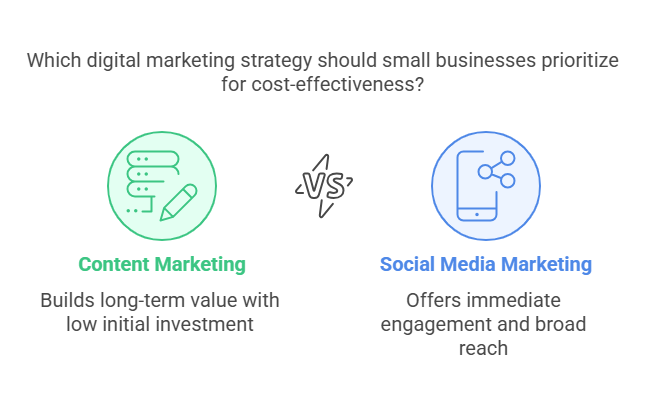
Invest in Content and Social Media Marketing for Maximum ROI
For most small businesses, content marketing and social media represent the most cost-effective starting points for digital marketing efforts. These channels require relatively low initial investment while building assets that continue delivering value over time.
Implementation recommendations:
- Begin with a simple content calendar focused on answering common customer questions
- Create educational content that showcases your expertise without being overtly promotional
- Repurpose core content across multiple formats (blog posts, social media, email, video)
- Focus on quality and consistency rather than volume or frequency
By building a foundation of valuable content, small businesses create assets that support all other marketing channels while establishing expertise and authority in their market.
Leverage Affordable AI Tools for Content and Customer Service
AI tools have dramatically reduced the expertise and resource barriers for sophisticated marketing activities. Small businesses can now implement AI-assisted workflows for content creation, customer service, and campaign optimisation without significant technical expertise.
Recommended approaches:
- Use AI writing assistants to create first drafts of blog posts, social media content, and email copy
- Implement basic chatbots to handle common customer questions and qualification
- Apply AI-powered analytics tools to identify patterns and opportunities in marketing data
- Use image generation and video editing AI to create professional-quality visual content
When properly implemented, these tools can multiply the output of small marketing teams while maintaining consistent quality and messaging.
Build an Email List and Focus on First-Party Data Collection
As privacy regulations tighten and third-party data becomes less accessible, Landscape for Small Businesses must prioritise building their own customer data assets through direct relationships.
Effective first-party data strategies include:
- Creating valuable lead magnets that incentivise email sign-ups
- Implementing progressive profiling to collect additional customer information gradually
- Using on-site interactions and purchases to build detailed customer profiles
- Clearly communicating the benefits of sharing information to increase opt-in rates
These first-party data assets become increasingly valuable as privacy restrictions limit third-party targeting options, providing small businesses with a significant competitive advantage.
Use Analytics to Guide Decision-Making and Optimise Spend
Even basic analytics implementation can dramatically improve marketing effectiveness by shifting decisions from intuition to data-driven insights.
Essential analytics practices for small businesses:
- Implement proper tracking across all digital properties and campaigns
- Establish clear performance benchmarks for each marketing channel
- Regularly review performance data with a focus on identifying actionable insights
- Reallocate resources from underperforming to high-performing channels based on actual results
This data-driven approach ensures marketing resources deliver maximum business impact rather than being allocated based on trends or preferences.
Collaborate with Micro-Influencers and Engage Niche Communities
Landscape for Small Businesses, broad influencer partnerships deliver poor returns compared to targeted collaborations with micro-influencers who have established credibility within specific communities.
Effective micro-influencer strategies include:
- Identifying influencers whose audience closely matches your target customer profile
- Developing authentic partnerships based on genuine product appreciation
- Creating collaborative content that provides value beyond product promotion
- Measuring partnership performance based on engagement and conversion metrics rather than reach
These targeted collaborations typically deliver higher engagement rates and conversion metrics at lower costs than partnerships with larger influencers or traditional advertising approaches.
Embracing the Digital Future
The digital marketing landscape for small businesses continues to evolve, creating both challenges and opportunities for those willing to adapt. With 51% of small businesses planning to invest more in social media ads and content marketing, and 47% in search advertising and video marketing, competition for customer attention will only increase in the coming years.
For UK small businesses specifically, success in this environment requires a strategic approach that balances emerging technologies with proven fundamentals:
- Building sustainable digital assets that deliver long-term value
- Adopting appropriate AI and automation tools to enhance efficiency
- Implementing proper measurement frameworks to guide decision-making
- Developing first-party data strategies to navigate privacy changes
- Focusing resources on channels most relevant to specific business objectives
By combining these elements into a cohesive digital marketing strategy, small businesses can compete effectively against larger competitors while achieving sustainable growth in an increasingly digital marketplace.
About ProfileTree
ProfileTree is a leading digital marketing and web design agency headquartered in Belfast, serving small and medium-sized businesses across Northern Ireland, Ireland, and the UK. Our comprehensive services include SEO, web development, content marketing, social media management, and digital training.
Our team specialises in helping small businesses develop effective digital marketing strategies tailored to their specific goals, audience needs, and resource constraints. To learn more about how we can support your digital marketing efforts, visit our website or contact our team directly.
